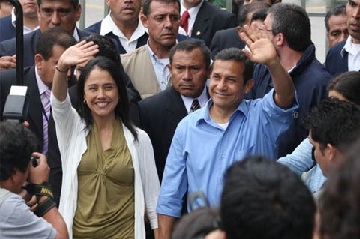
President-elect Ollanta Humala waves to supporters. (Photo courtesy of Globovision)
Many voters across Peru were able for the first time to see local coverage of the hotly-contested June 5, 2011, presidential runoff by watching reports online and on the air, thanks to a year-long project by Knight International Journalism Fellow Hena Cuevas.
In five provincial areas of Peru, TV stations that belong to the Red TV network produced Election Day stories and uploaded them to YouTube. From there, more than 35 other stations affiliated with the network had access to the regional stories.Many voters across Peru were able for the first time to see local coverage of the hotly-contested June 5, 2011, presidential runoff by watching reports online and on the air, thanks to a year-long project by Knight International Journalism Fellow Hena Cuevas.
In five provincial areas of Peru, TV stations that belong to the Red TV network produced Election Day stories and uploaded them to YouTube. From there, more than 35 other stations affiliated with the network had access to the regional stories. The stations also posted videos to their Facebook pages and then linked the videos to Red TV’s main national program, Enlace Nacional. For the program’s nine million daily viewers, the result was the broadest perspective on the elections many have ever had. In the past, regional stations rarely shared reports and little coverage of outlying areas reached viewers in Lima, the capital.
“We even did our first-ever Skype live shot for the Web!” reported Cuevas. “In the end, regardless of who won the election, it was the voters and the viewers who really won. They were able to watch reports from five different regions, and to truly understand what was happening – not just in their own area, but across Peru.”
Ollanta Humala, a 48-year-old retired military officer once associated with Hugo Chavez, edged out Keiko Fujimori, the daughter of a former Peruvian president now in prison.
The first regional report came via Skype from outside a polling station in Tacna, in the southwestern tip of Peru about 600 miles from Lima. There was also a Skype report from the newsroom of Villa El Salvador, the capital city’s largest suburb. Enlace Nacional anchor Yovany Quintana did a live Skype interview for Telemundo in Los Angeles, and the station provided five live streaming interviews for their website.
Click here to watch a report on election coverage.
Click here to watch Enlace Nacional’s first Skype interview for the web.